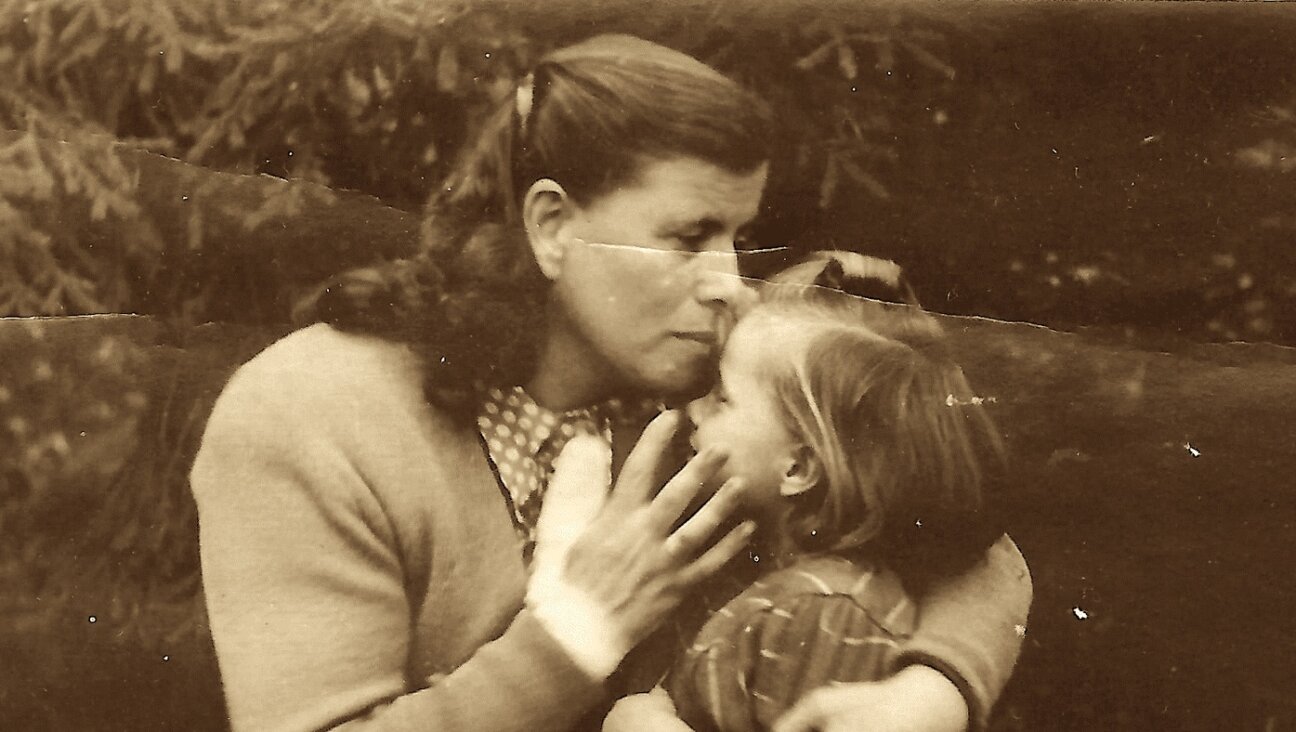Meet the upbeat Yiddish-chatting Israeli soldier, Yonatan
Yonatan Alman shares Yiddish videos of his experiences on Israel’s northern front, even one demonstrating how to load ammunition.

Graphic by Angelie Zaslavsky
In accepting his Nobel Prize for literature in December 1978, the Yiddish novelist Isaac Bashevis Singer described Yiddish as “a language not supported by any government, a language which possesses no words for weapons, ammunition, military exercises or war tactics.”
Israeli commander Yonatan Alman apparently never got the memo.
Ever since the IDF called up the 33-year old reservist on Oct. 8 — a day after the horrific attacks by Hamas — he has been sharing his experience there through short, upbeat Yiddish video clips on whatsapp, including one on how to load a projectile in battle.
He also agreed to have the Forward post several of them on the Forverts YouTube channel.
In one of these clips, Alman, who has been deployed to Israel’s northern border, rides in a tank down a dusty road, boldly singing the Hymn of the Partisans, a Yiddish fighting song inspired by the Warsaw Ghetto Uprising in 1943. His proud rendition of a song connected to battling the Nazis seems to have struck a chord, drawing more than 10,000 views in less than a week.
In another, clip Alman wishes his viewers “a gitn shabes” — a good Shabbos — while displaying a kugel the army sent for the Sabbath and sharing a well-known Yiddish proverb about kugel: “A shabes on kigl iz vi a foygl on a fligl” (“Sabbath without a kugel is like a bird without a wing”).
A Yiddish demo video on loading ammunition
Perhaps Alman’s most surprising clip is one on how to load ammunition during battle. Contrary to what Singer said, there are many military terms in Yiddish, but since Alman doesn’t have a Yiddish dictionary handy, he improvises some of them. For the word “warhead,” for example, he says “kepele” (“little head”).
In the Hebrew-speaking Israeli military, it’s rare to find soldiers proudly speaking in Yiddish. Israel’s government and society espoused a negative view towards the language for decades. As Jewish educator Avi Blitz has explained, throughout Israel’s history, Yiddish was “viewed as the language of diaspora, exile and victimhood, a feminine language that had no place in the hyper-masculine utopia of a modern Jewish country.” Literary scholar Yael Chaver summed it up: Yiddish was “what must be forgotten.”
Within the last decade or so, there’s been growing interest in Yiddish culture in Israel. But most people singing in Yiddish publicly tend to be much older than Alman. And few of them speak it as fluently as he does.
Learning Yiddish with Duolingo
So who is this Israeli soldier sharing his love of mame-loshen with the world?
Alman, who works as a sales and marketing representative in Tel Aviv, was born in Kfar Daniel, a moshav in central Israel, in 1990. A son of British-born immigrants, he didn’t grow up speaking Yiddish. He studied it as an adult through the language-learning app Duolingo, and took several courses at the Yiddish learning center, Beit Shalom Aleichem, in Tel Aviv.
In recent years, he has performed regular Yiddish concerts for Beit Leivick, a Yiddish cultural center in Tel Aviv, accompanying himself on the piano or accordion. “In 2008, a friend of mine who’s an accordion player pretended to be a beggar, performing the accordion on a street corner,” he said in an interview. “After trying to play it myself, I decided to buy one.”
What else does Alman do in his spare time? “I like to ride my motorcycle, go hiking and hang out with my friends,” he said.
Alman’s late father, Shloimy Alman, spoke Yiddish fluently. In 2019, an exhibition in London featured dozens of photographs the elder Altman had taken of life in Jewish London in the 1970s, including shots of kosher butchers, wine merchants and Jewish bakeries.
In an article about the exhibit, Shloimy Alman indicated that his knowledge of Yiddish came in handy when he approached his subjects. “They were all friendly, loved me coming in and chatting in Yiddish and taking a picture,” he said.
Keeping calm
Now that Alman is on reserve duty, he’s made a hobby of creating and posting these videos, always calm and in good spirits. In one, he displays the canned foods he’s received from well-wishers, including olives, salted peanuts and chopped pineapple. In another, we see him lying in a foxhole after having received warning of an imminent attack, and cheerfully sharing a Yiddish joke.
In our interview, I asked him whether he isn’t at all frightened.
“There were moments where I was really worried, like when I heard reports that terrorists had infiltrated the northern border,” he said. Luckily, those reports turned out to be a false alarm.
“In any case, my goal in sharing these videos is that I think Yiddish can make people smile and hopefully feel better,” he said. “It definitely works for me.”






















